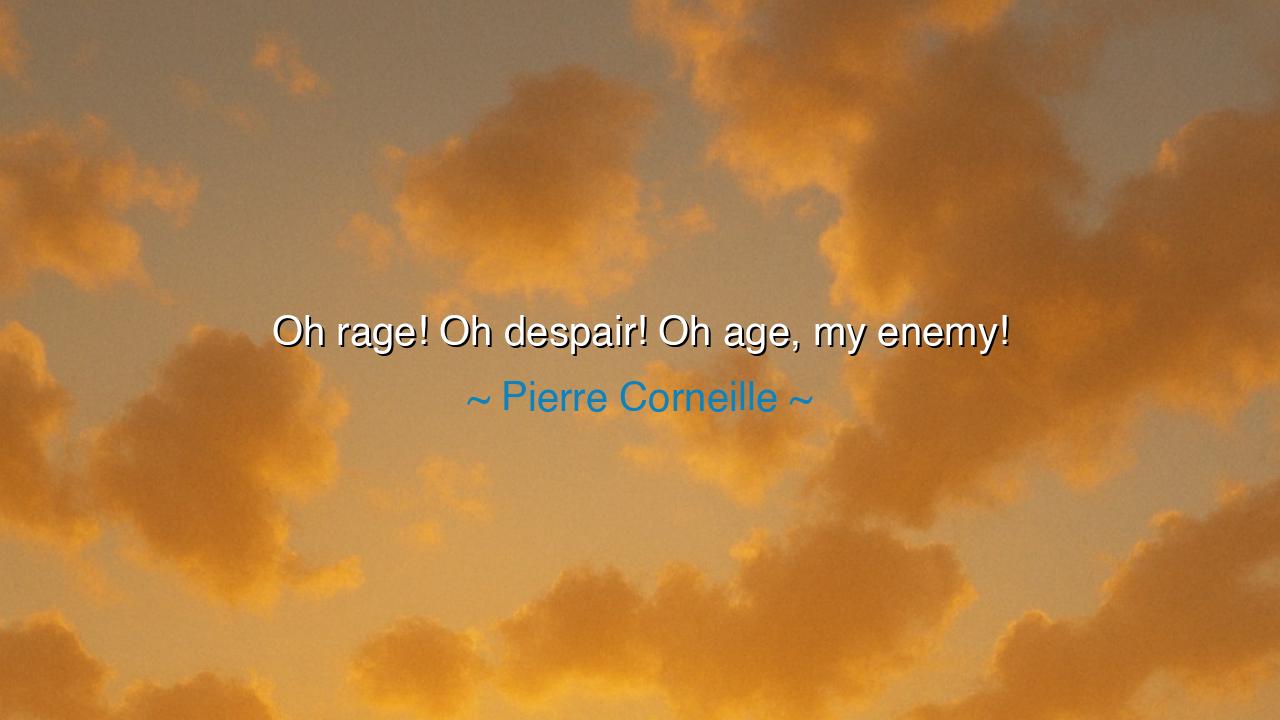
Oh rage! Oh despair! Oh age, my enemy!






"Oh rage! Oh despair! Oh age, my enemy!" These words, spoken by the great Pierre Corneille, resonate with the raw, anguished cry of a soul facing the inevitable decline that time brings. In this lamentation, Corneille captures the profound struggle that many experience as they confront the relentless march of age. It is a cry of frustration, a reflection on the limitations that age imposes upon the body, the mind, and the spirit. In his sorrow, the speaker denounces age as an enemy, for it steals away youth, strength, and the boundless potential that once seemed infinite. To him, age is not just a simple passage of time, but a cruel adversary that takes away what was once vibrant and full of possibility.
In youth, we are filled with the fire of ambition, driven by the belief that we are invincible, that we are capable of overcoming any obstacle. But as time passes, this energy fades, and we begin to feel the weight of years pressing upon us. The passion of youth gives way to the reality of aging, and with it, comes a profound sense of loss—the loss of strength, of health, and of the dreams that once seemed so close. It is in this transition that many, like Corneille’s speaker, find themselves in rage and despair, helpless in the face of a force as inevitable as time itself.
Consider the life of King Lear, a figure whose tragic story speaks to the deep pain of growing old. Lear, once a mighty king, filled with power and authority, finds himself in the later years of life stripped of his strength and position. His rage against his advancing age is palpable in Shakespeare's portrayal, as he faces the betrayal of his daughters and the crushing realization that his mind and body are no longer what they once were. Lear’s cry of frustration mirrors that of Corneille’s speaker, for Lear, too, sees age as an enemy, robbing him of control over his life and kingdom. In this story, we see the devastating effect of age on a once-strong spirit, and the despair that comes from feeling powerless in the face of time’s inexorable passage.
Yet, as much as rage and despair may seem natural in the face of age, there is also a deeper truth embedded in Corneille’s words. To see age as an enemy is to deny the potential for growth and wisdom that can come with the years. While it is true that age brings its share of challenges, it also brings the opportunity for reflection, for learning, and for reconnection with the deeper truths of life. The anger of old age often arises from the resentment of losing what was once easy or natural, but it is in acceptance and embracing the changes of age that true strength can be found.
Take, for example, the life of Nelson Mandela, who, despite the hardships of old age—spending 27 years in prison and suffering from health ailments—emerged from his later years as a leader of profound wisdom and strength. Rather than seeing age as an enemy, Mandela embraced it, using his years of suffering and experience to guide a nation toward peace and reconciliation. His ability to rise above the frustration of physical decline and to channel his energies toward a greater purpose shows that while age may steal the body’s strength, it can also empower the soul, sharpen the mind, and fortify the spirit.
In this sense, Corneille’s lamentation calls us to confront the natural desire to fight against the inevitable passage of time. The rage and despair he speaks of are the first reactions of one who does not yet understand that old age is not a defeat, but a part of the greater journey of life. The key to aging gracefully is not to view it as an enemy to be vanquished, but as a season to be navigated with wisdom, acceptance, and strength. It is a time to redefine what it means to live well, to reconnect with what truly matters, and to share the knowledge and experiences that come with a lifetime of learning.
Thus, the lesson from Corneille’s words is not merely a warning about the challenges of old age, but a call to embrace it as a phase of life that can be lived fully. In youth, we are often too focused on the external world, on gathering power or seeking pleasure. But in old age, we must turn inward, seeking the deeper sources of strength—the inner wisdom, the peace that comes from knowing that we have lived a life of purpose, and the compassion that comes with knowing the fragility of our existence.
Let us, therefore, prepare for the inevitable aging process not with fear or frustration, but with a resolve to live with meaning, to face the challenges with dignity, and to use our experience to guide others. The rage and despair of old age can be transformed into strength and wisdom if we learn to accept its inevitable arrival and seek the beauty that it can bring. Age is not an enemy; it is simply the next chapter in our journey, one that can be lived with grace and purpose.






AAdministratorAdministrator
Welcome, honored guests. Please leave a comment, we will respond soon